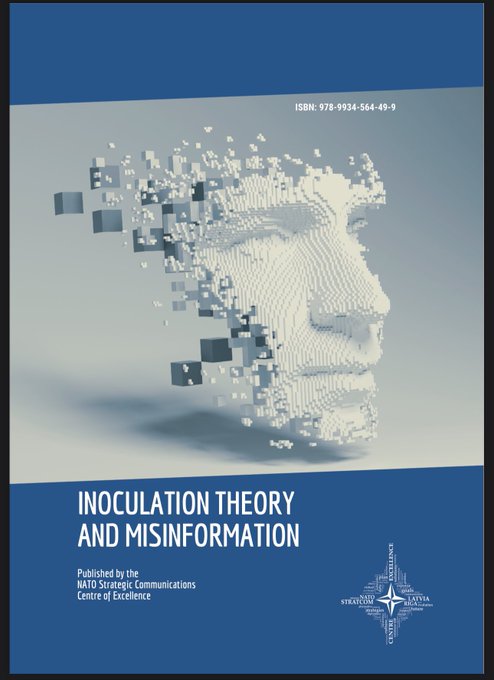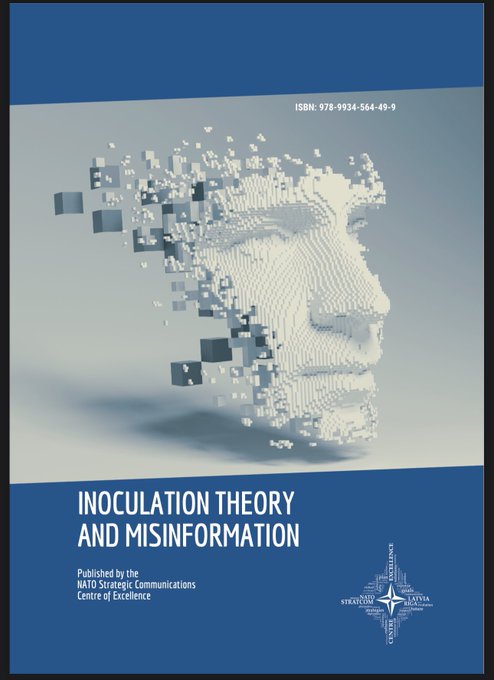“If you think of information as a virus, instead of treating an infection once it has taken hold — that is, debunking — it is much better to vaccinate so that the body is inoculated.” Welcome to pre-bunking.
On Wednesday (May 28), just over a week before the EU elections commence, European Commission President Ursula Von der Leyen unveiled her latest (and hopefully last) censorship initiative: pre-bunking. This approach, she says, is “more successful than debunking” and will allow society to “build up… immunity to misinformation.”
Von der Leyen drew heavily on the vernacular of virology and vaccinology to describe her pre-bunking initiative. This, of course, is ironic given her present embroilment in the “Pfizergate” vaccine procurement scandal, which is the subject of not one, but two, criminal investigations. It is also disconcerting to hear one of the most powerful political leaders of the so-called “liberal” West liken information to a virus. As I will show in this article, she is not the only one.
As with medicine, Von der Leyen says, prevention is preferable to cure: “If you think of information as a virus (NC: which, to be fair, most right-thinking people probably don’t), instead of treating an infection once it has taken hold — that is, debunking — it is much better to vaccinate so that the body is inoculated.” That is where pre-bunking comes in.
The EU will start “pre-bunking”:
– Debunking suggests exposing false information
– Pre-bunking” entails more government gatekeepers, smearing and censorship against those who challenge the EU’s monopoly on truth pic.twitter.com/HHiduewd0s— Glenn Diesen (@Glenn_Diesen) May 30, 2024
Building “Immunity” Against Misinformation
Like vaccines, pre-bunking intentionally exposes people to a weaker dose of mis- or dis-information (as defined by the Commission, presumably), so that their minds can build up antibodies to resist real fake news stories later down the line. In the words of the concept’s creator, Sander van der Linden, “you preemptively try to refute falsehoods or the techniques that are used to dupe people online, so that people can build up cognitive or mental antibodies so that when they come across them in the future they are partly immune.”
Sander van der Linden is a Dutch professor of social psychology at the University of Cambridge. His books include Foolproof: Why Misinformation Infects Our Minds and How to Build Immunity and The Psychology of Misinformation. The titles speak for themselves.
Van der Linden’s lab is apparently partnered with the UK government, the US State Department, and CISA (Cybersecurity and Infrastructure Security Agency), the notorious censorship agency embedded within the Department of Homeland Security. That’s according to Mike Benz, a former State Department official who is arguably the top expert on the US censorship industry. CISA has its own subsidiary: the Office of Biometric Identity Management. This gives an idea of how digital censorship will soon be tied up with biometric digital identity.
These institutions are at the leading edge of the collective West’s rapidly growing censorship industrial complex. Their role, notes Benz, is primarily, if not exclusively, political:
Here, watch this star of the US-UK govts new political “thought control” game industry explain his other games controlling the psychological response to gov’t Covid-19 policies.
Note how the government’s censorship targets are all posts criticizing the government: pic.twitter.com/8QMNAPvbqJ
— Mike Benz (@MikeBenzCyber) September 14, 2023
Van der Linden’s pre-bunking ideas have gained traction in some important places, including Silicon Valley. In February, Google Alphabet revealed plans to run a series of animated ads on platforms such as TikTok and YouTube featuring pre-bunking techniques developed in partnership with researchers at the Universities of Cambridge and Bristol. The ads have been shown in five EU countries: Belgium, France, Germany, Italy, and Poland. Viewers watching the ads are asked to fill in a short multiple-choice questionnaire, designed to gauge what they have learned about misinformation.
So, in other words, Google, a company that was recently forced to withdraw its Gemini image generator after suffering worldwide ridicule over “inaccuracies” in some of the historical depictions that it was creating, is now trying to train untold millions of EU citizens in the art of identifying mis- and disinformation.
“A Vaccine for Brainwash”
Another organisation experimenting with pre-bunking is, perhaps unsurprisingly, the North Atlantic Treaty Organisation (NATO). The organisation’s Strategic Communications Centre of Excellence recently published a report co-authored by Van der Linden. Titled “Inoculation Theory and Misinformation,” the report discusses ways of “build(ing) psychological resilience against misinformation through psychological ‘vaccines’ or ‘inoculation.’”
If this sounds like something straight out of Dr. Strangelove, that’s probably because, as the report notes, the theoretical background of “inoculation theory” dates all the way back to the 1960’s when the US government “became concerned about the prospect of its troops becoming brainwashed (or persuaded) by foreign propaganda” during the Vietnam War:
This concern prompted the social psychologist William McGuire to explore the idea of a “vaccine for brainwash”. Drawing on the analogy of medical inoculations, McGuire proposed that rather than bombarding people with more supportive facts, pre-emptively exposing people to a weakened dose of a specific persuasive (manipulative) argument could confer psychological resistance against future exposure to persuasive attacks, much like a medical vaccine confers physiological resistance against future infection. Over the years, inoculation treatments came to feature two core components: 1) a forewarning of an impending attack on one’s beliefs, and 2) a pre-emptive refutation of the persuasive argument, also called a “prebunk.” Since then, a large volume of studies and metaanalyses has been conducted, establishing inoculation theory as a robust framework for countering unwanted persuasion.
Although the original paradigm has proved highly replicable, for a long time it was never
tested in the context that inspired McGuire’s idea: brainwashing and propaganda. This began
to change around 2017, when researchers started to apply inoculation theory within the
modern context of online misinformation.
A (Philip K) Dickensian Future
The gathering interest among governments, generals and Silicon Valley companies in ideas like “pre-bunking” underscores one of the darkest aspects of the censorship industrial complexes taking root in ostensible liberal democracies: the increasing emphasis on taking preventative actions against illegal, mis- or dis-information. It is eerily reminiscent of “pre-crime”, the concept first coined by Phillip K Dick to express the notion that the occurrence of a crime can be anticipated and prevented before it even happens.
“The monitoring obligation of all actors” involved in the EU’s Digital Services Act (DSA) “is preventative,” warned Manfred Kölsch, a retired German judge, in a blistering critique of the EU’s censorship regime featured in Berliner Zeitung (which we covered here):
It is always about “expected critical (effects)”,… “foreseeable adverse effects” on “social debate”, “public safety” or “public health”. The Advocate General at the ECJ has said what is legally necessary: These represent a “particularly serious interference with the right to freedom of expression” “because by restricting certain information before it is disseminated, they prevent any public debate about the content, thus “(d)epriving freedom of expression of its actual function as a motor of pluralism.” The Advocate General correctly points out that preventive information controls ultimately abolish the right to fundamentally unrestricted freedom of expression and information.
Kölsch also warned that the DSA directly contravenes many of the EU’s and national laws on freedom of expression and information, including Article 11 of the EU Charter of Fundamental Rights, Article 10 of the European Convention on Human Rights and Article 5 of the Basic Law (Germany’s written constitution, agreed by the allies back in 1949 when the first post-war government was established in West Germany). Here is the text of Article 11 of the EU Charter of Fundamental Rights:
Everyone has the right to freedom of expression. This right shall include freedom to hold opinions and to receive and impart information and ideas without interference by public authority and regardless of frontiers.
Not anymore, it seems.
A Milestone in Global Online Censorship
The upcoming EU elections will represent a milestone in online censorship. This is the first time bloc-wide elections have been held since the full launch of the DSA in February (covered in my article, The EU’s Mass Censorship Regime Is Almost Fully Operational. Will It Go Global?) So far, all of the main platforms, including Elon Musk’s X, appear to be adhering to the EU’s rules on disinformation. If they don’t, they could face serious economic consequences, including fines of up to 6% of global turnover.
At her speech at Davos this year, Von der Leyen said that the “top concern” among the World Economic Forum’s partner companies (which also happens to be one of the Commission’s biggest worries) is “misinformation and disinformation.” The solution, she said, is to forge a grand coalition of sorts between “business and governments” — which, as luck has it, fits snugly with the WEF’s primary mission in life: to promote public private partnerships at all levels and in all areas of government, for the benefit primarily of its partner companies.
In February, just one month after that speech, the Commission published a set of guidelines for Big Tech firms to help Brussels “secure” the upcoming elections from foreign interference and other threats. The guidelines recommend “mitigation measures and best practices to be undertaken by Very Large Online Platforms and Search Engines before, during, and after electoral events,” and are explained as necessary in order to prevent things like fake news, turnout suppression, cyber threats and attacks, and, of course, Russia’s malign influence on European public opinion, particularly regarding Ukraine.
“Integrity of election(s) is one of my top priorities for DSA enforcement, as we are entering a period of elections in Europe,” said Thierry Breton, (EU Internal Market Commissioner) last September.
Elections in Slovakia in September were supposed to offer a dummy run, but the results were disappointing — at least as far as the Commission was concerned. The left-wing populist and social conservative party, Direction–Social Democracy (Smer-SD), led by former Prime Minister Robert Fico, took the largest number of votes and was able to form a coalition government with like-minded parties. Fico had promised to cut all aid to Ukraine, which he says is governed by neo-Nazis, as well as block its ascension to NATO.
As readers well know, Fico was shot five times in an assassination attempt two weeks ago but somehow survived and is now apparently on the mend. As Conor Gallagher reported shortly afterwards, Fico’s opposition to Project Ukraine and the rabid demonisation of his political stance by mainstream media appear to have played a key role in motivating his would-be assassin.
The Commission’s mass censorship regime is the culmination of a process that began at least a decade ago, as I previously documented. But it is determined to up its censorship game. Two weeks ago, VdL pledged to create a new disinformation unit for detecting and weeding out online disinformation promoted by foreign agents while using education to “inoculate” (that word again!) EU citizens against false information. The Orwellian title for this new initiative? “European Democracy Shield.
The irony of VdL, once described by POLITICO EU as “Europe’s American president”, talking about the risks posed by foreign agents is, of course, rather rich. But there is an even darker irony.
The EU is currently venting its spleen against the government of Georgia for daring to pass a law seeking to rein in Western meddling as US-EU assets seek to push a colour revolution in the country, just as they did in Ukraine in 2013-14. EU Commission President Ursula von der Leyen has even argued that the Georgian government’s “law on foreign influence transparency goes against (the) core principles & values of the EU, negatively impacting Georgia.” What she hasn’t said is that the Commission she heads up is also seeking to pass similar regulation aimed at combating foreign interference — the so-called “European Democracy Shield”.
“the law on foreign influence transparency goes against core principles & values of the EU”
So why is the EU drafting identical legislation all member states have to adopt?
🧐🧐🧐🧐🧐 https://t.co/5epE40adTG pic.twitter.com/GBhOwhUB93
— Kit Klarenberg 🔻🔻🔻🔻🔻 (@KitKlarenberg) May 29, 2024
While Von der Leyen is a big-part player in all of these processes, the sad truth is that they would almost certainly be happening with or without her. They may even accelerate under her rumoured successor, Mario Draghi. As Conor Gallagher documented in his recent piece, Combating Hate: The Trojan Horse for Precrime, burgeoning censorship and anti-hate efforts are proliferating across the world’s ostensible liberal democracies. And “while hate could mean a racist comment or action; it could also now refer to criticism of Israeli policy or a thought crime against the ruling class.”
This is a key point. While the governing classes in the so-called “liberal” West can dig up a plethora of reasons for censoring online discourse — from protecting children from harmful content to preserving faith in the new generation of “vaccines”, to preventing widespread discussion of, say, central bank digital currencies — the reality is that governments and the corporations whose interests they serve are rapidly losing control of the narrative. The only way of regaining control is through Stasi-like censorship. And that, unfortunately, will mean the end of what little precious remains of liberal democracy.










